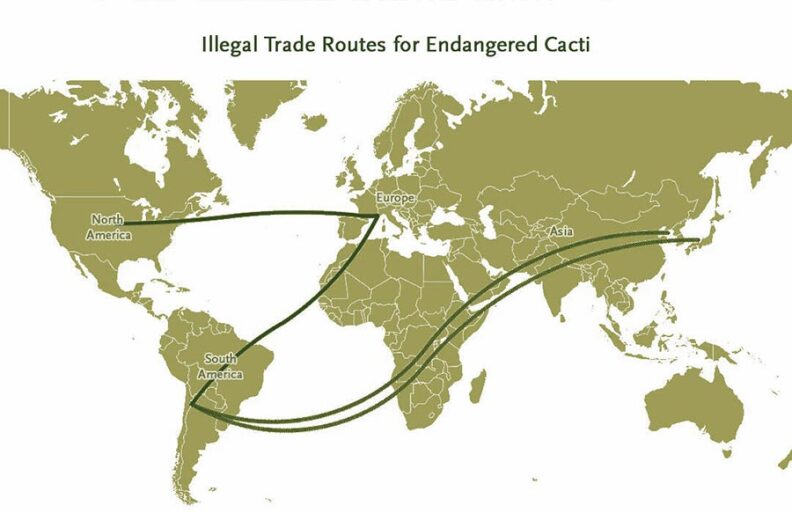The Huntington Botanical Gardens has a plant theft problem. It’s a global issue.
The Huntington Botanical Gardens in San Marino has a problem with plant thieves.
Whole succulent plants have been swiped in brazen heists. Smaller pieces of plants have been pilfered for propagation.
“It’s heart-wrenching,” said John Trager, curator of the Desert Collections at the Huntington Botanical Gardens. “We’re interested in preserving the plants and habitats so that they can continue to be studied.”
Recently, an echeveria succulent was taken from the Desert Garden, a hot spot for thieves at The Huntington.
“It is a problem,” said Nicole Cavender, director of botanical gardens. “We’ve had it way too many times than we should, but what we want to do is draw attention to this illegal trade that’s really criminal activity.”
A global black market

A map from The Huntingon shows illegal trade maps for endangered cacti taken from the wild in South America. The Huntington notes: “Traffickers sometimes ship plants through intermediate countries to hide the plants’ origins.”
Courtesy The Huntington Library, Art Museum, and Botanical Gardens.
)
Cavender said it’s not just within the walls of The Huntington that this is an issue, there’s a global network where succulents, cacti, orchids, cycads, magnolias and other plants are trafficked on the black market.
Illegal plant harvesting in the wild is a serious issue around the world, and it’s hard to estimate the dollar value of the illicit trade, Cavender said.
“Sometimes these plants are being collected by the hundreds, literally wiping out the populations,” she said.
How you can help
That’s why Cavender and Trager urge plant lovers to take note of where they’re buying plants from to make sure they are legally sourced, especially for those sold online.
After a series of thefts in the Desert Garden in 2021, staff installed a permanent sign that reads “This plant was stolen,” and directs visitors to more information about the illicit plant trade.
Trager also works to assist authorities with identification of plant contraband at ports and airports. That includes an opuntia species of cactus that’s endemic to Santa Margarita Island off the Pacific Coast of Mexico which was confiscated at LAX in 2018.
Now Trager is growing the cactus at the Huntington, along with several other confiscated plants, in order to sell them to the public.
The Huntington recently joined a global working group focused on promoting responsible practices in the nursery industry.
“When these plants are taken, it’s an indication that there is a demand,” Trager said.
“We can’t stop the demand, but we can provide a sustainable source.”

